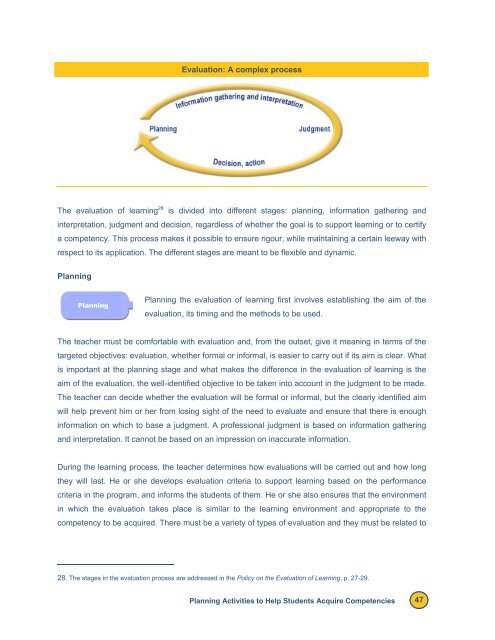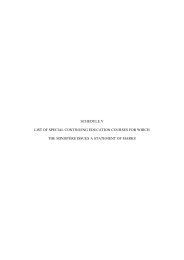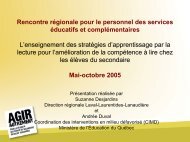Reference Framework for Planning Learning and Evaluation Activities
Reference Framework for Planning Learning and Evaluation Activities
Reference Framework for Planning Learning and Evaluation Activities
Create successful ePaper yourself
Turn your PDF publications into a flip-book with our unique Google optimized e-Paper software.
<strong>Evaluation</strong>: A complex process<br />
The evaluation of learning 28 is divided into different stages: planning, in<strong>for</strong>mation gathering <strong>and</strong><br />
interpretation, judgment <strong>and</strong> decision, regardless of whether the goal is to support learning or to certify<br />
a competency. This process makes it possible to ensure rigour, while maintaining a certain leeway with<br />
respect to its application. The different stages are meant to be flexible <strong>and</strong> dynamic.<br />
<strong>Planning</strong><br />
<strong>Planning</strong><br />
<strong>Planning</strong> the evaluation of learning first involves establishing the aim of the<br />
evaluation, its timing <strong>and</strong> the methods to be used.<br />
The teacher must be com<strong>for</strong>table with evaluation <strong>and</strong>, from the outset, give it meaning in terms of the<br />
targeted objectives: evaluation, whether <strong>for</strong>mal or in<strong>for</strong>mal, is easier to carry out if its aim is clear. What<br />
is important at the planning stage <strong>and</strong> what makes the difference in the evaluation of learning is the<br />
aim of the evaluation, the well-identified objective to be taken into account in the judgment to be made.<br />
The teacher can decide whether the evaluation will be <strong>for</strong>mal or in<strong>for</strong>mal, but the clearly identified aim<br />
will help prevent him or her from losing sight of the need to evaluate <strong>and</strong> ensure that there is enough<br />
in<strong>for</strong>mation on which to base a judgment. A professional judgment is based on in<strong>for</strong>mation gathering<br />
<strong>and</strong> interpretation. It cannot be based on an impression on inaccurate in<strong>for</strong>mation.<br />
During the learning process, the teacher determines how evaluations will be carried out <strong>and</strong> how long<br />
they will last. He or she develops evaluation criteria to support learning based on the per<strong>for</strong>mance<br />
criteria in the program, <strong>and</strong> in<strong>for</strong>ms the students of them. He or she also ensures that the environment<br />
in which the evaluation takes place is similar to the learning environment <strong>and</strong> appropriate to the<br />
competency to be acquired. There must be a variety of types of evaluation <strong>and</strong> they must be related to<br />
28. The stages in the evaluation process are addressed in the Policy on the <strong>Evaluation</strong> of <strong>Learning</strong>, p. 27-29.<br />
<strong>Planning</strong> <strong>Activities</strong> to Help Students Acquire Competencies 47




